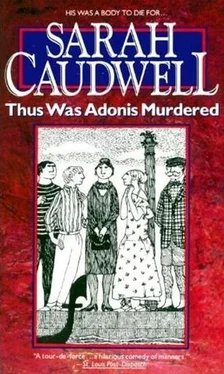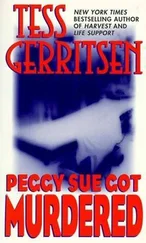Sarah Caudwell - Thus Was Adonis Murdered
Здесь есть возможность читать онлайн «Sarah Caudwell - Thus Was Adonis Murdered» весь текст электронной книги совершенно бесплатно (целиком полную версию без сокращений). В некоторых случаях можно слушать аудио, скачать через торрент в формате fb2 и присутствует краткое содержание. Жанр: Иронический детектив, на английском языке. Описание произведения, (предисловие) а так же отзывы посетителей доступны на портале библиотеки ЛибКат.
- Название:Thus Was Adonis Murdered
- Автор:
- Жанр:
- Год:неизвестен
- ISBN:нет данных
- Рейтинг книги:5 / 5. Голосов: 1
-
Избранное:Добавить в избранное
- Отзывы:
-
Ваша оценка:
- 100
- 1
- 2
- 3
- 4
- 5
Thus Was Adonis Murdered: краткое содержание, описание и аннотация
Предлагаем к чтению аннотацию, описание, краткое содержание или предисловие (зависит от того, что написал сам автор книги «Thus Was Adonis Murdered»). Если вы не нашли необходимую информацию о книге — напишите в комментариях, мы постараемся отыскать её.
Thus Was Adonis Murdered — читать онлайн бесплатно полную книгу (весь текст) целиком
Ниже представлен текст книги, разбитый по страницам. Система сохранения места последней прочитанной страницы, позволяет с удобством читать онлайн бесплатно книгу «Thus Was Adonis Murdered», без необходимости каждый раз заново искать на чём Вы остановились. Поставьте закладку, и сможете в любой момент перейти на страницу, на которой закончили чтение.
Интервал:
Закладка:
CHAPTER 9
Between the best of friends a difference of opinion may arise. So it was with Selena and myself on the matter of Sunday. It seemed to me plainly convenient that I should spend the day at Selena’s. Thus Timothy, when he telephoned, would have the immediate benefit of my advice.
“I’m sorry, Hilary,” said Selena. “I have an Opinion to write on the Settled Land Act. I can’t spend the day in cooking and idle gossip.”
She was quite wrong in supposing that she would have been put to any trouble for my entertainment: the tastes of the scholar are simple to the point of austerity. An omelette of some kind for lunch, with a salad and a few new potatoes; for dinner, a plain grilled sole, perhaps with a caper sauce—
“No,” said Selena. “Moreover, I have plans for the evening which do not admit of the presence of a third party.”
In that case, naturally, there was nothing more
to be said. Selena has an amiable arrangement for the weekends with a young colleague of mine: I would not for the world encroach on the pleasures of either. I spent Sunday, therefore, in Islington, conversing with the cats and reading back copies of The Times: both, in their way, instructive occupations.
Selena telephoned me at half past six. Timothy’s news, so far as it went, was, she felt, satisfactory. He had not yet seen Julia — accommodation had been found for her in the little resort of Chioggia, on the other side of the Lagoon — but would be dining with her that evening. His client, having chosen to make the journey from Cyprus by sea, had become unwell during the journey and had fortunately not yet recovered.
“Fortunately?” I said, with a touch of severity. “One wishes him, of course, no harm.” The smoothness of Selena’s voice was not impaired by the intervening telephone wires. “It does seem convenient, however, that Timothy is free for the time being to pursue his enquiries on Julia’s behalf without having to initiate his client into the mysteries of Schedule 5 to the Finance Act 1975.”
“Have his enquiries made any progress?”
“He hasn’t managed to see Graziella yet or talk to the police. But he’s been in touch with a man at the British Consulate who seems to know something of the matter. So far as one can tell at present, there’s nothing solid against Julia at all. It’s just that she made a rather unfortunate first impression on the police. They knew from the start, you see, about her exchanges with the young man from the Revenue: the whole affair was apparently common knowledge among the staff of the Cytherea, from the management to the chambermaids. So when they began to question her and she said she’d never heard of him, they found her attitude suspicious.”
“I can see that they might,” I said. “Why did she say that she’d never heard of him?”
“My dear Hilary, it’s quite understandable. They obviously told her that they were enquiring into the death by violence of a Mr. Edward Watson. It doesn’t immediately occur to one that a person referred to as Edward is someone one knows as Ned. And Julia, naturally, wouldn’t know his surname.”
“Would you care,” I asked, “to justify the adverb?”
“How could she have known his surname? Eleanor Frostfield doesn’t seem to have mentioned it when she introduced them. How do you suggest that she could afterwards have discovered it? Would you expect her, in the middle of telling the young man about his beautiful eyelashes and quoting Catullus, suddenly to ask his surname? Going on, perhaps, to demand such further particulars as his place of birth, his mother’s maiden name and the number of his passport? Of course not. Still less can you imagine that Julia would stoop, in search of such information, to questioning their mutual acquaintances or prying through the young man’s correspondence. My dear Hilary.” Her voice seemed to melt in a delicate mixture of amusement and reproach: an effect, I am told, which has caused a number of her opponents, realizing the absurdity of their submissions, to settle hastily over the luncheon adjournment on terms favourable to her client.
“My dear Selena,” I said, “you quite persuade me that no woman of breeding and refinement could be expected to know the surname of any young man whom she was trying to seduce. I hope that Timothy will be equally successful with the Italian police. Was there anything else that made a bad impression on them?”
“Well—” said Selena. “They seem to have got rather excited about Julia’s Finance Act. I’m sorry, Hilary, I’ll have to go — there’s someone at the door.”
I saw no prospect, until I knew why Julia’s Finance Act had disturbed the equanimity of the Italian police, of giving my attention to the concept of causa. On the following morning, therefore, I proceeded directly to 62 New Square. Not pausing to announce myself in the Clerks’ Room, I climbed the stone staircase to the second floor. Being occupied for the purposes of their profession by the younger members of the Chambers, the second floor is commonly referred to as the Nursery. The Nursery comprises three rooms, of varying sizes: I shall not delay my narrative to explain the finely balanced considerations of decorum, convenience and seniority by virtue of which Selena has the small one to herself, Ragwort and Cantrip share the large one and Timothy occupies the one of intermediate size.
For conversation, their natural tendency is to gather in the large one. I found Selena already there, repeating to Ragwort and Cantrip the news from Timothy which she had given me on the previous evening.
“Selena,” I said, “what’s all this about the Finance Act?”
“Ah yes,” said Selena. “The Finance Act. It appears that a copy of this year’s Finance Act, inscribed with Julia’s name and professional address, was found a few feet away from the corpse.”
“Oh, strewth,” said Cantrip.
“Dear me,” said Ragwort.
“The Italian police,” continued Selena, “with childish naïveté, took this to be a clue. As your own more sophisticated minds will immediately perceive, it is, of course, nothing of the kind. One cannot infer Julia’s presence from the presence of her Finance Act.”
“Indeed not,” said Ragwort. “Any more than one could infer, from the presence last Thursday fortnight in Lower Liversidge County Court of a copy of Woodfall on Landlord and Tenant, clearly inscribed with my name, to indicate that it was my property, purchased out of my own resources, that I myself was appearing before that learned and august tribunal; or that I was absent from London; or that, being in London, I had no need of the volume in question for the purpose of advising my clients. It can merely be inferred that certain members of these Chambers—”
“I said I was sorry,” said Cantrip. “There’s no need to keep on about it”
“That certain members of these Chambers,” continued Ragwort, “whose names I shall not mention because they have apologized and I, as was my duty, have forgiven them, have very little notion, when it comes to books, of the difference between meum and tuum.”
“Exactly,” said Selena. Cantrip, overcome by the joy of Ragwort’s forgiveness, said nothing.
“Have you,” I asked, “heard anything more from Julia?”
“As a matter of fact,” said Selena, “there was another letter this morning. I was just going to read it.”
Terrace of the Cytherea.
Thursday evening.
Dearest Selena,
My letters to you — are they mere ephemera, stop-gap economies for telephone calls? Or are they to serve, in half a century’s time, when you are retired from high judicial office and I, too improvident to afford retirement, still pursuing the vain chimera of paying the last year’s income tax, am advising my clients from the comfort of a Bath chair — are they to serve then as a journal or memoir, when we seek diversion in reminiscence? If so, it would be absurd, though nothing I now write can reach London before me, to end the correspondence with yesterday’s letter. The postscript, it is true, will tell us that I had my way. But when you ask me how I achieved it, I shall have forgotten; and when I ask you whether I enjoyed it, you will be unable to remind me; and when we say to each other that surely there was some curious and interesting sequel, but cannot quite remember what it was, there will be nothing to recall it to our aging memories. For the avoidance of which and the resolution of all doubts, I shall continue to write until tomorrow evening.
Читать дальшеИнтервал:
Закладка:
Похожие книги на «Thus Was Adonis Murdered»
Представляем Вашему вниманию похожие книги на «Thus Was Adonis Murdered» списком для выбора. Мы отобрали схожую по названию и смыслу литературу в надежде предоставить читателям больше вариантов отыскать новые, интересные, ещё непрочитанные произведения.
Обсуждение, отзывы о книге «Thus Was Adonis Murdered» и просто собственные мнения читателей. Оставьте ваши комментарии, напишите, что Вы думаете о произведении, его смысле или главных героях. Укажите что конкретно понравилось, а что нет, и почему Вы так считаете.











